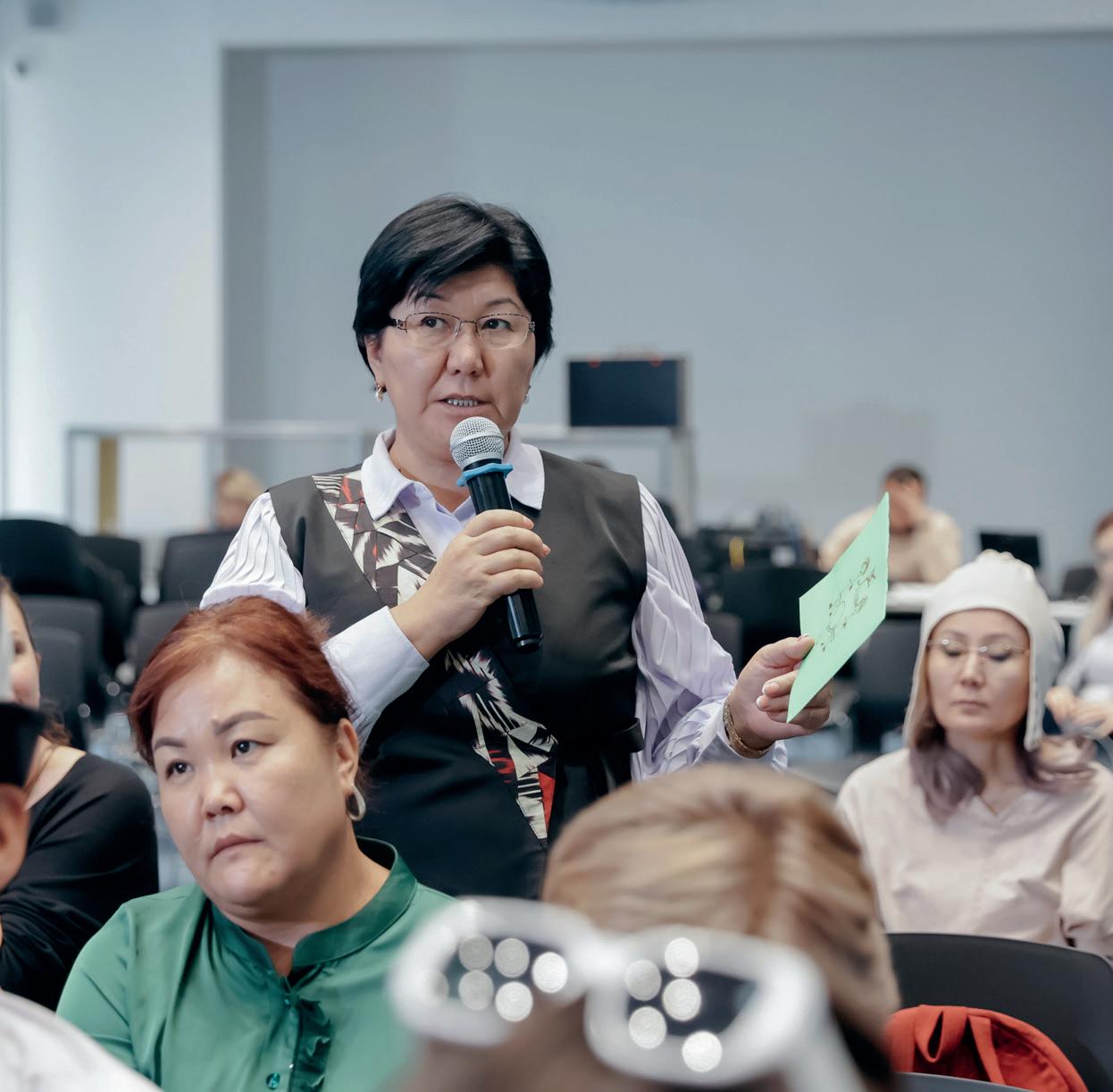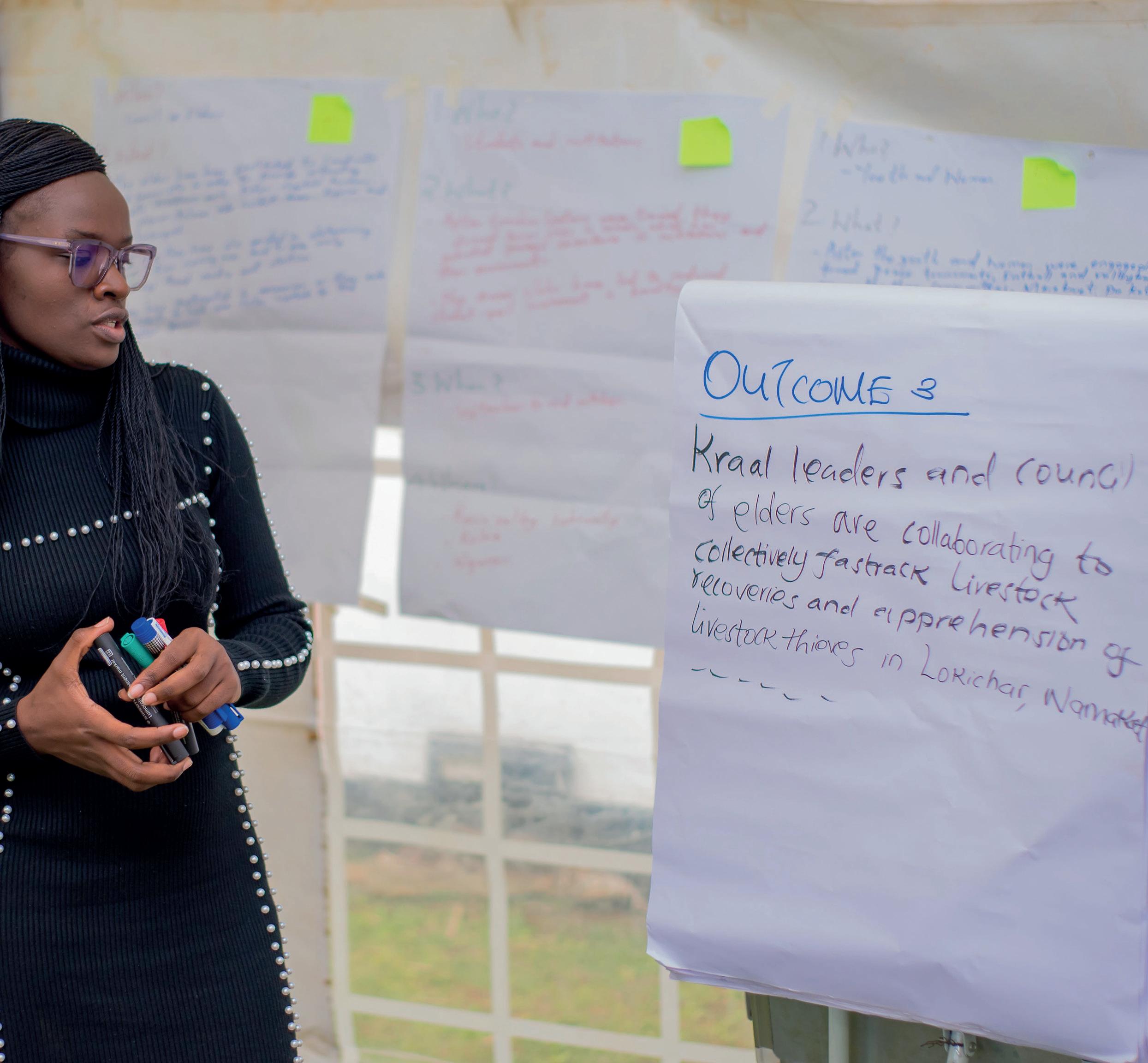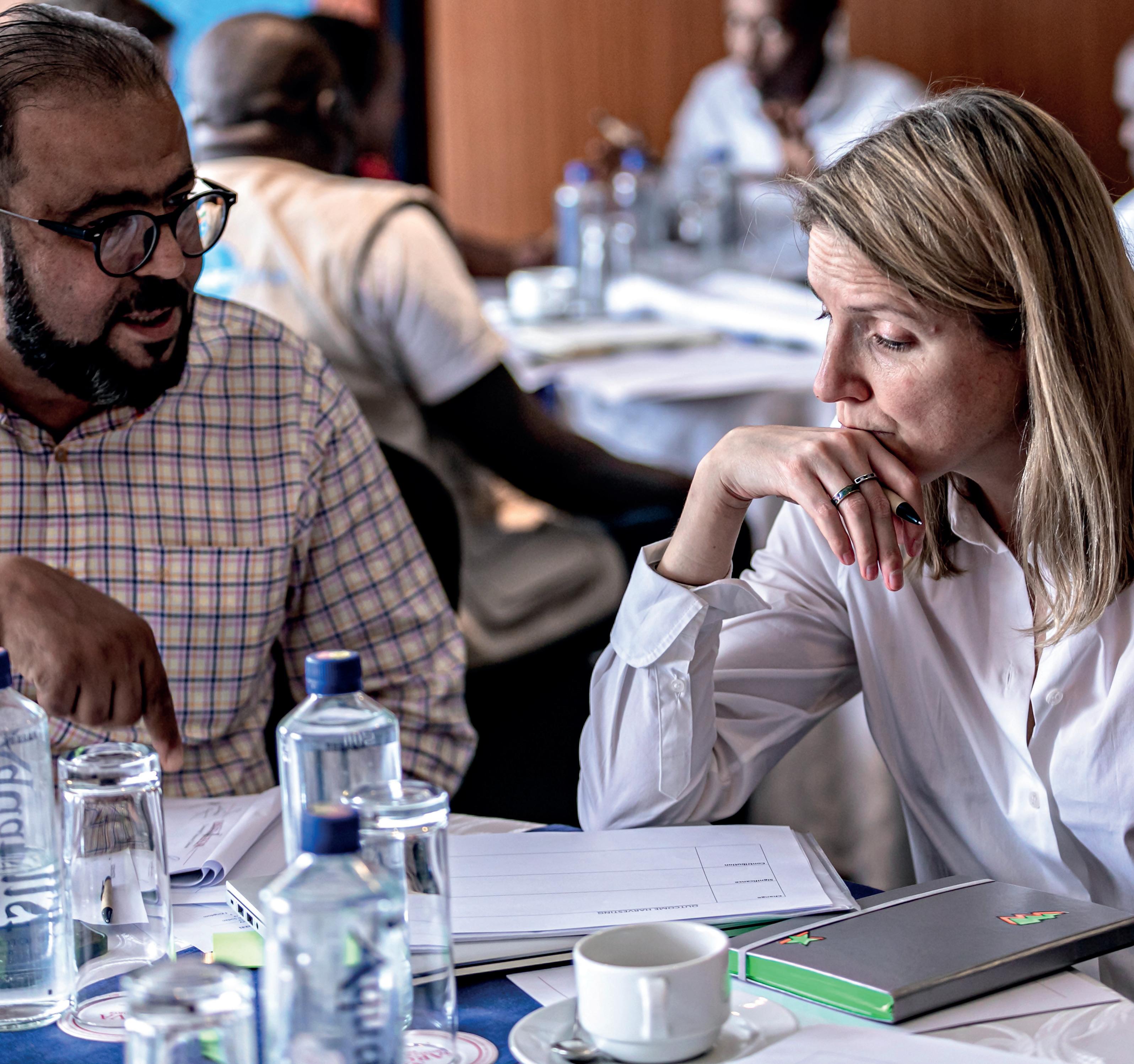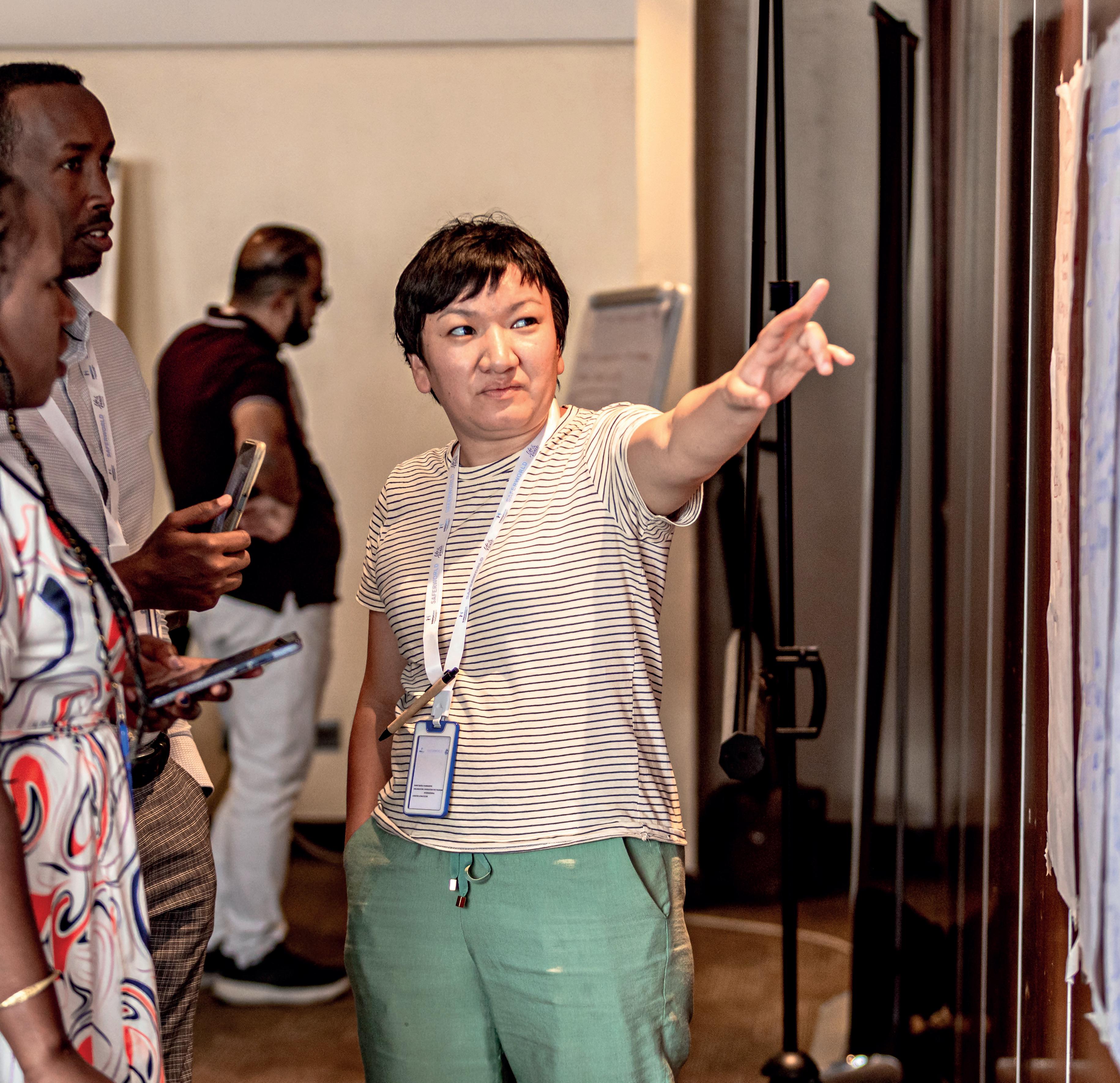

Outcome harvesting: Saferworld’s approach
What is outcome monitoring and harvesting?
Monitoring, evaluation and learning (MEL) is a core part of the work that humanitarian, development and peacebuilding organisations do. At Saferworld, we are committed to learning from our work so that those most affected by conflict and insecurity experience the biggest changes.
We use an adapted version of ‘outcome harvesting’, where we focus on identifying real change that has happened and work backwards to understand how we contributed to this change. Outcome harvesting combines elements of ‘outcome mapping’ (understanding behaviour changes) and ‘utilisationfocused evaluation’ (ensuring evaluations are useful and practical).
Unlike traditional evaluation methods, outcome harvesting doesn’t involve measuring progress towards predetermined outcomes. Instead, we ask:
n Who is doing what differently, when and where?
n How significant is this change in practice or change in relationship?
n What contribution did the programme make to this change?
n What evidence do we have?
Outcome monitoring is Saferworld’s innovation. Instead of waiting until a project is over, we monitor outcomes as we go along. Our focus is on changes in the behaviour of those we seek to influence, and on the relationships between them. This approach works particularly well for monitoring programming in complex environments where the paths to achieve change are often unclear and unpredictable, and theories of change need to be modified over time to respond to changes in the context.

What we can offer
n Two-hour online introduction to outcome harvesting.
n One- or two-day training workshops (online or in person) for people who manage projects and programmes in complex environments and who have some experience of MEL as programme leaders, project managers/coordinators, grant managers and/or participants. The workshops cover the basic aspects of developing and using an outcome-focused monitoring and learning system and provide insights and practical tips for putting such a system in place.
n Bespoke training for your organisation.
n Bespoke strategic support to introduce outcome monitoring and harvesting as an organisational approach, facilitate outcome harvesting workshops, and provide mentoring to others through accompaniment and advice.
To find out more, contact us at: services@saferworld-global.org
Why do we use outcomefocused approaches?
Saferworld works with people and communities affected by conflict to create safer and more secure environments. Our work primarily focuses on behaviour and relationship changes by and between different people, groups and institutions. To achieve this, we define outcomes as ‘what others do differently because of our work’. By clearly identifying these outcomes, we support everyone – communities, partners and teams –to monitor progress and measure success in ways that matter most to them.
Using this straightforward language enables teams, partners and programme participants to clearly define their own criteria for success. We work from the assumption that, for example, if a community can say what kind of behaviour and practice they want from the authorities that serve them, they will not only act as agents to bring about that change – they will also be interested in monitoring it.
Outcome monitoring and harvesting offer a way for us to get to the heart of what matters. It is a straightforward and easy-to-understand method of shifting attention away from our activities (what did we do?) and onto the practical and observable shifts in actions by the people, groups and institutions our programmes seek to influence (what did they do differently?).
Case study
The Western Balkans
Over a two-year period (2021–2023) Saferworld provided accompaniment support to GIZ (the German development agency), the Italian Ministry of the Interior and the Dutch Center for International Legal Cooperation to integrate an outcome harvesting approach through their monitoring, evaluation and learning systems across six countries in the Western Balkans.
We organised a range of consultation meetings and workshops to understand the outcome areas in which participants wanted to see changes, practical trainings on the use and application of outcome harvesting, and exchange workshops on lessons emerging from two years of programming. Legal practitioners, members of the police and government officials spoke of how the approach helped them “recognise common challenges”, and offered “a sense of inspiration or motivation” and a “greater insight into all the different aspects of a wide programme”.
Why is outcome monitoring and harvesting important for you?
I love these workshops, they help us to stop our race of project implementation activities and to reflect on what works and what does not work, and how we need to adapt our interventions to be more effective and sensitive.
Bakhram from Foundation for Tolerance International, Kyrgyzstan, on his experience of Saferworld’s outcome harvesting workshops.
You can use outcome monitoring and harvesting for several purposes:
n To put power in the hands of partners and communities – MEL for everyone.
n To document changes in very clear ways – who did what differently? Where did this happen? When? Why is it significant, and what contribution did you make?
n To provide practical ways to put conflict and gender sensitivity into practice – by understanding and responding to the negative and positive effects of interacting in a specific conflict context. A change could be significant with one actor group in one context but insignificant in another.
n To assess what you might need to adapt, shift, reinforce and remove as you go into the next phase.
n To start discussions among groups involved in a project (donors, international organisations, national/ civil society partners and communities) about what is working, why it is significant, and how to adapt the project effectively.
n To create outcome stories that develop over time and that show your theory of change is relevant and working.
n To compile data sets for evaluations that track changes against time and context.
n To create project, annual and strategic grant reports.
n To improve your work and your proposals.
Case study
The Global Community Engagement and Resilience Fund
In late 2023 Saferworld provided training and accompaniment support to the Global Community Engagement and Resilience Fund and its partners to support their uptake of outcome harvesting. This included a remote training workshop over two days and multiple ‘help desk’ clinics to assist partners in Asia, Europe and Africa to discuss challenges, adapt the approach to their existing programmes and identify stories of change around violent extremism.
Participants described the approach as “useful for understanding tangible results”, “giving people a sense of ownership” and “allowing us to see the bigger picture”. Partners went on to pilot outcome harvesting with their own teams to inform reporting and future project design.

Saferworld’s experience
Saferworld has designed and developed our outcome harvesting approach over 12 years. We embed this method in all our programmes and in our policy and advocacy work.
We’ve created a more participative, analytical, learningfocused and adaptive approach to inspire our staff and our partners. We want everyone to see themselves as MEL practitioners, and to experience MEL not as a compliance and upward accountability exercise but as part of a professional commitment to high-quality programming.
At Saferworld, all teams and their partners run outcome harvesting workshops, develop outcome stories and upload them onto an online outcomes database that we have developed. Other teams review these outcomes and learn from them. When evaluations are commissioned, we make these outcome stories available as evidence to evaluators. This helps us to substantiate our theory of change, both programmatically and organisationally.
Further resources
Doing things differently: Rethinking monitoring and evaluation to understand change Doing evaluation differently
Upending the system: putting people at the heart of monitoring and evaluation
Available on the Saferworld website
Case study
The Swedish Embassy in Liberia
In 2023, the Swedish Embassy in Monrovia, Liberia, commissioned Saferworld to deliver a hybrid workshop for the Swedish International Development and Cooperation Agency and its partners in Liberia to improve their ability to capture results and impact. This responded to the Embassy’s focus on reporting outcomes rather than activities in complex development and livelihood programmes.
Saferworld’s jargon-free workshop introduced outcome harvesting, with practical exercises to document changes in behaviours and relationships among individuals and institutions. Participants found the approach transformative, with one stating, “A one-day training changed so much in my thinking; I’m rewriting my annual report based on this.”
Contact us
Contact us to find out what we can do for you: services@saferworld-global.org
For further information on our outcome monitoring and harvesting approach please visit: www.saferworld-global.org/what-we-do/learning
About Saferworld
Saferworld is an independent, not-for-profit international organisation working to prevent violent conflict and build safer lives in countries and territories across Africa, Asia and the Middle East. We work in solidarity with people affected by conflict to improve their safety and sense of security, and conduct wider research and analysis. We use this evidence and learning to improve local, national and international policies and practices that can help build lasting peace. Our priority is people – we believe in a world where everyone can lead peaceful, fulfilling lives, free from fear and insecurity.
Keep up to date with our work by signing up at www.saferworld-global.org/who-we-are/ stay-informed or by following us on social media.

Saferworld, The Brick Yard, 28 Charles Square London N1 6HT, UK
Phone: +44 (0) 20 7324 4646
Email: general@saferworld-global.org
www.saferworld-global.org
Registered charity no. 1043843
